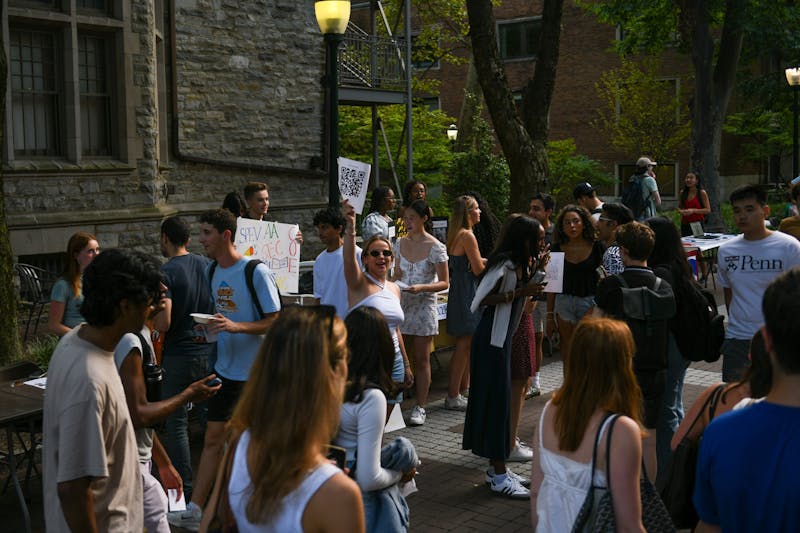
I came to Penn looking to scratch an itch. One of the first ways I wanted to become active in the Penn community was to become involved in politics. I'm a bit of an enigma, though, when it comes to political identification. I'm socially liberal but fiscally conservative; I guess you could almost call me a libertarian. I registered as a Democrat in my home state of New York, but decided to cover all my bases by registering as a Republican here in Pennsylvania (and to the best of my knowledge, I have not broken any laws).
To test the political waters at Penn, I checked out the two major political groups on campus -- the College Republicans and the College Democrats -- to see which group better fit me. What I found was disappointing. Rather than make an effort to establish a unique identity that reflects both modern thought and the feelings of the members, these two groups blindly follow the party line.
Now you might be wondering what exactly the problem is here. Isn't it the job of these groups to do just that? However, I believe this question scratches at the deeper one of how to best define a Republican or Democrat.
Across the nation, the definition varies. A Republican from the North can be more "liberal" than a Democrat from the South, and vice versa. As a demographic, college students also tend to be more liberal than other groups. When you mix up all these factors on a college campus, what defines "Republican" or "Democrat" will rarely, if ever, jive with the party line. Rather than recognize this potential difference, these groups ignore it and sweep it under the rug.
Robert Kennedy once remarked, "You see things the way they are and ask, 'why?' I look at things that never were and ask, 'why not?'" I would be more than satisfied if either of these groups made a unique effort to try and answer either of these questions. Show me why I, the average college student, should care. Show me how you can bring national politics to Penn in a way that is appealing and reflects the beliefs of college students. Unfortunately, if the national party takes a stance, the College Democrats and Republicans turn to their respective parties and reply, with unwavering devotion, "Thank you, sir, may I have another?"
I'm not advocating these groups to break with party lines on all issues; this would be unreasonable. I have, however, noticed opportunities for these two groups to take a distinct stance where their respective party lacks one or has one that makes no sense, at least to the average college student.
For example, the Supreme Court recently struck down a Texas statute banning private consensual sex between adults of the same gender. Good news one would think. Yet a member of the College Republicans chastised the ruling because "it could have extremely bad results ... like [movements for] polygamy, incest and pedophilia," and "Democrats say that the issue is that the legal recognition of marriage should be based on love." What, I ask, would the College Republicans prefer to base marriage on? I'm not so sure I want to know the answer.
What I see here is not independent and intelligent thought, but rather regurgitation of right-wing conservative rhetoric. Surely no one believes this stuff? I'd bet that few, if any, college students have a problem with this ruling. If the College Republicans member really believes that the court erred, then I'm sorry he's so closed-minded and ignorant. To me the rational thing for the College Republicans to say is, "Look, we know we're Republicans. We agree with a lot of their issues. But on this one we do not, and we'd prefer it be changed." That's all I'm asking for.
The College Democrats are not blameless either. Their national party has no clear identity. One member of the College Democrats recently remarked, "our strongest selling point of anything we've tried here this semester has been, 'Get Bush out of office.'"
This is not a stance on an issue, and it certainly is not an identity. I want to know what they stand for, not what they oppose. To capitalize on the identity vacuum, the group could pick a presidential candidate and show me why I should vote for him. It's a simple yet effective step that would show the Penn campus what the College Democrats really stand for. All we see are the College Democrats touting the initials of their ideal candidate, ABB -- Anyone But Bush. It leaves a lot to be desired.
It pains me to say so, but I feel that the College Dems and College Republicans have predominant flaws which ultimately undermine their effectiveness on a college campus. Sadly, what it boils down to are two groups, one blinded by the present, another stuck in the past -- and neither focusing on the future. All it's given me is one really big itch that still has yet to be scratched.
Craig Cohen is a Wharton sophomore from Woodbury, N.Y. He Hate Me appears on Fridays.
The Daily Pennsylvanian is an independent, student-run newspaper. Please consider making a donation to support the coverage that shapes the University. Your generosity ensures a future of strong journalism at Penn.
DonatePlease note All comments are eligible for publication in The Daily Pennsylvanian.







